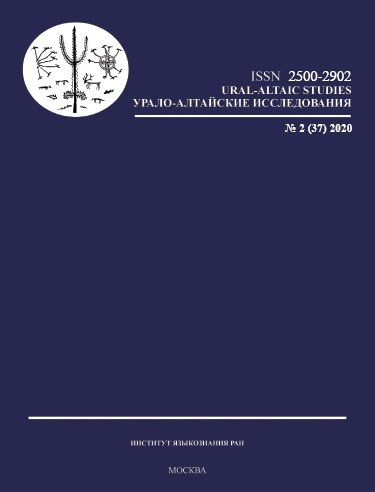Гендерные стереотипы в хакасских и якутских паремиях
The gender stereotypes of the Khakass and the Yakut paremias
Author(s): Aida Egorova, Valentina N. Tuguzhekova, Nadejda G. Kanzychakova, Zinaida Ye. KaskarakovaSubject(s): Gender Studies, Customs / Folklore, Comparative Linguistics, Sociolinguistics, Turkic languages
Published by: Институт языкознания Российской академии наук
Keywords: turkic languages; Khakass language; Yakut language; paremia; proverbs; sayings; metaphors; gender roles; gender stereotypes; male stereotypes; female stereotypes; androcentrism; androkratiya;
Summary/Abstract: The article focuses on the study of gender stereotypes reflected in paremias of the Khakass and the Yakuts, turkic-speaking peoples with common historical roots and similarities in their languages and folklore. The study analyzed 177 paremias reflecting gender stereotypes and social behavior of men and women (91 items in Khakass and 86 items in Yakut), applying the methods of content analysis and intent analysis in order to identify the content and intentions (latent focus) of paremias, and comparison of paremias in the Khakass and Yakut languages was carried out. On the whole, the content of the Khakass and Yakut paremias is rather voluminous, and the latent focus on gender stereotypes is clearly traced. In the Khakass proverbs the following intentions prevail: “Caution”, “Instruction”, “Evaluation”, “Guidance”, “Reproach”, “Justification”, “Exposure”, and in the Yakut proverbs the following intentions prevail: “Praise”, “Instruction”, “Caution”, “Evaluation”, “Exposure”, “Reproach”, “Council”. In the Khakass and Yakut languages the following male stereotypes prevail: “Admonition” and “Praise”, and the following female stereotypes prevail: “Caution”, “Exposure”, “Reprimand”, “Reproach”. A comparative analysis of the Khakass and Yakut paremias based on the reconstruction of deep layers of archaic consciousness of historically related peoples showed the proximity of gender and marriage-family mindset. The paremias of the Khakass and Yakut peoples reflect traditional family-tribal relations built on androcratic (patriarchal) mindset, strict regulations of gender differences, dichotomization of male and female, hierarchy of status of men and women. The traditional gender relations of the Khakass and the Yakuts were masculine-oriented; they were dominated by the idea of gender inequality which caused women to be exposed to a larger numb er of prohibitions related to exogamous marriage — avoidance, abduction, karams, payment of kalym, etc.
Journal: Урало-алтайские исследования
- Issue Year: 2020
- Issue No: 02 (37)
- Page Range: 17-30
- Page Count: 14
- Language: Russian

